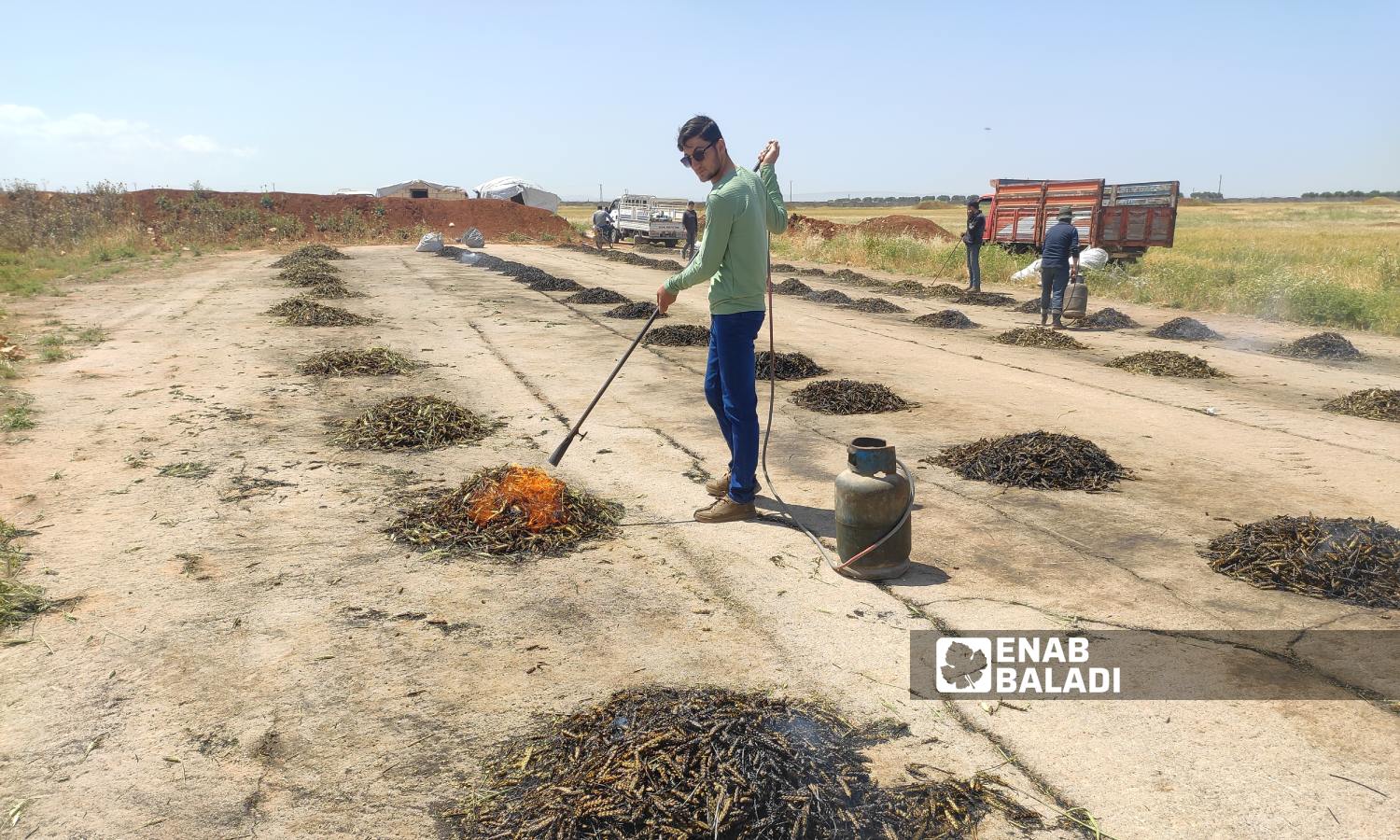



Enab Baladi – Hassan Ibrahim
In a traditional custom used by the people, the season of Freekeh began in northwestern Syria, an annual ritual that is a source of livelihood and a culture inherited from the ancestors.
The farmers and locals roast the unripened wheat and crush it into small pieces.
The farmers and land tenants are expected to face many difficulties that burden them and make preparing Freekeh a risk of bearing losses.
The Freekeh season begins with the first week of May each year and continues for days not exceeding a month, when the wheat ear is slightly damp in most regions of northern Syria, with some areas being distinguished from others.
The process begins by cutting the ears of wheat and seldom relies on manual shearing, as in cases where the harvester cannot enter the ground due to the presence of wheat among the trees.
The wheat ears are exposed for hours in the sun to dry, then burn, after which they are packed in large bags and transported to a mill machine to sort the Freekeh grain from the remains and residues of burning, such as straw and soil, to be ready for sale.
Hassan Hilal, a displaced farmer, told Enab Baladi that the mechanism for burning the crop varies according to the region and custom, including that workers collect wheat ears to burn in one heap on an iron bed or that they are spread hundreds of meters on the roads and burned.
Hilal, who is waiting for work to prepare Freekeh every year, added that in both cases, the workers depend on burning through a pipe connected to a gas cylinder two to three meters away from the point of the fire.
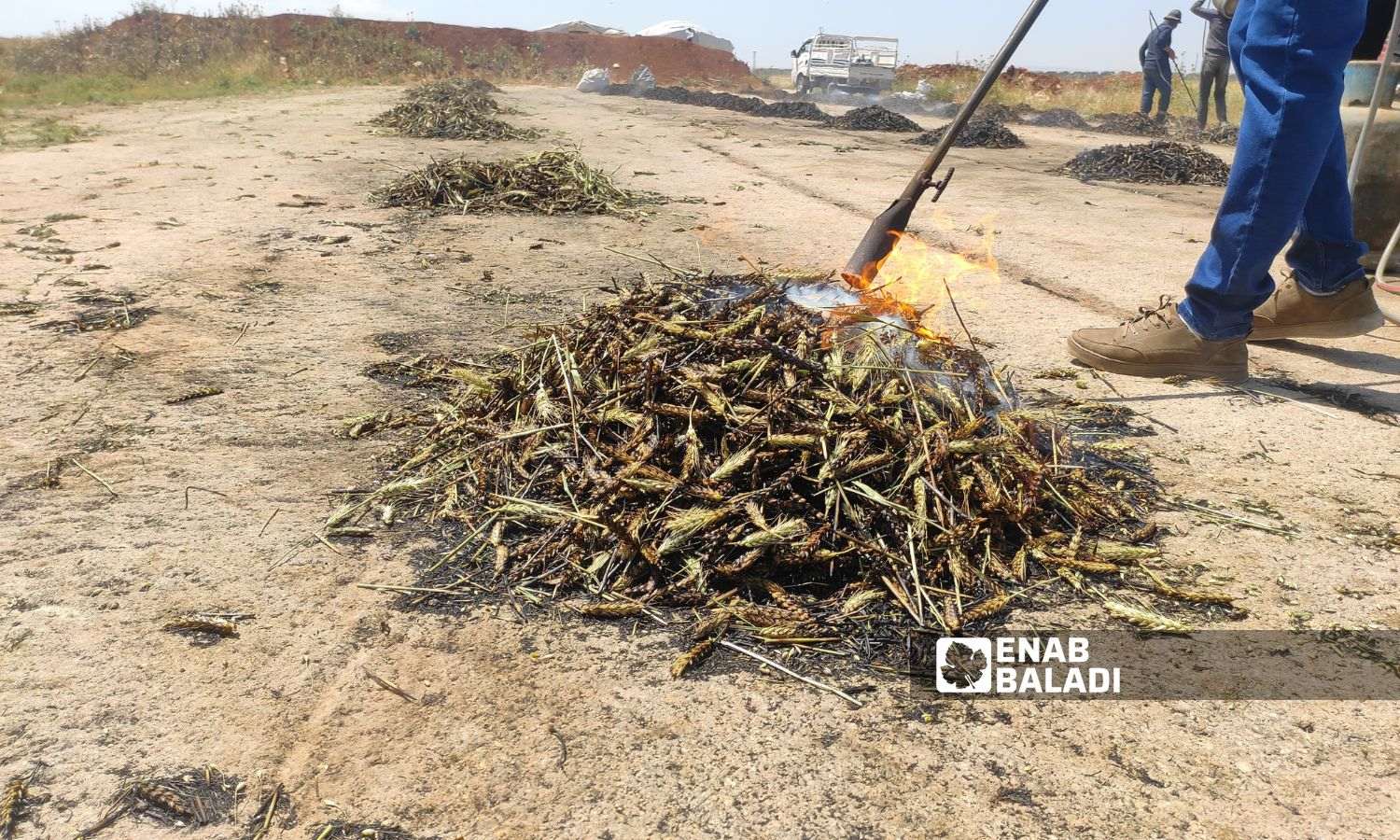
Roasted wheat ears for making Freekeh food in the eastern countryside of Idlib – May 14, 2023 (Enab Baladi)
The majority of the residents of northwestern Syria are waiting for the season of work by burning unripened wheat to make Freekeh, as it is a source of income that provides supplies and a financial return that supports families amid a deteriorating economic and living situation.
A large group of people work during the Freekeh season, and the work is not limited to young people or men, as women and children work during these few days to support their families.
The daily wage of a worker is 200 Turkish liras if he works as a “burner,” and women receive a daily wage of less than 100 Turkish liras, except for those who work as “burners,” whose wages are the same as men.
Those displaced to the cities and towns of northern Syria are taking advantage of this season, whether through work, renting land, or buying quantities of Freekeh, spreading it, sifting the crop from dust and straw, then the thresher stage (crushing), and packing it in bags of different weights according to the desire for sale or export.
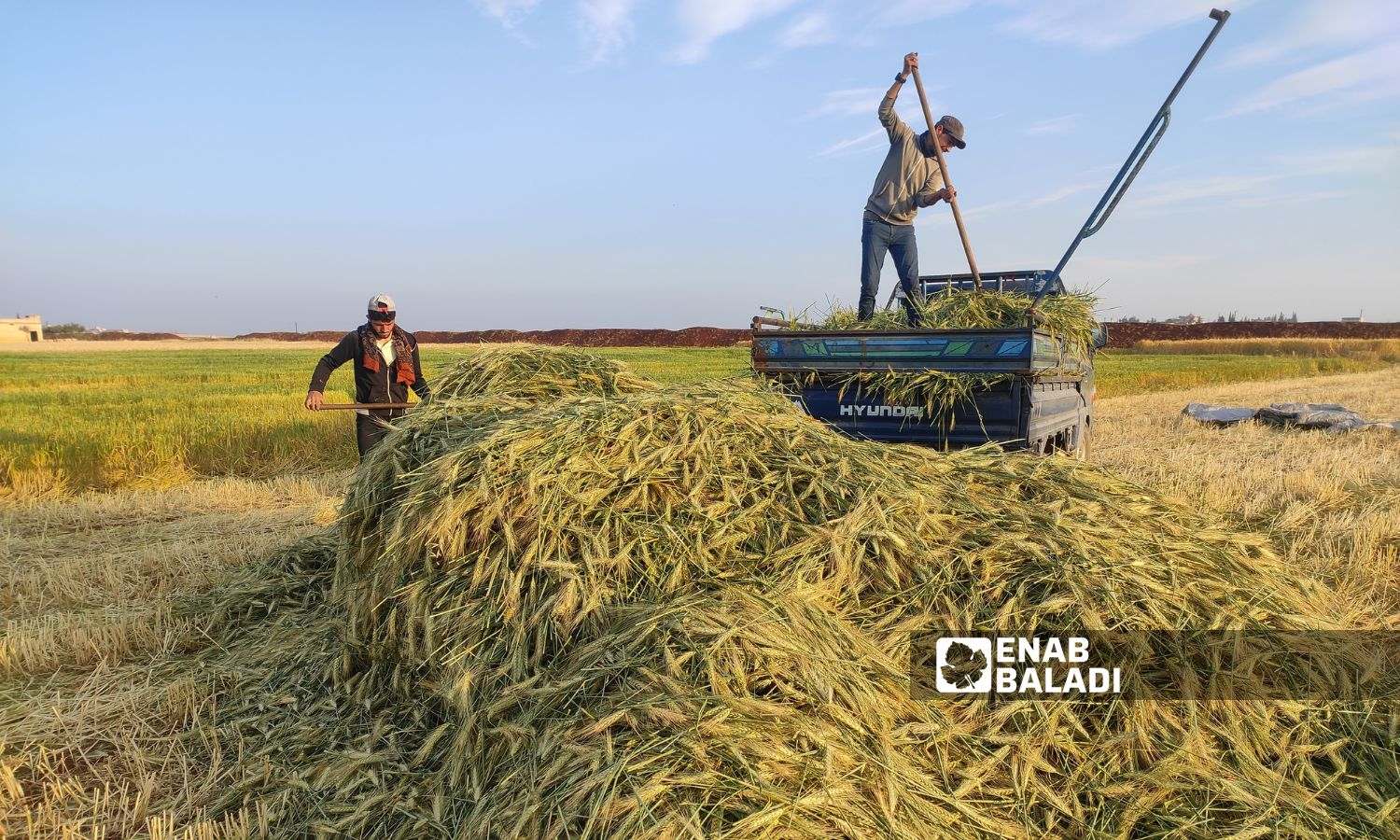
Two workers prepare the unripened wheat crop to prepare Freekeh food in the eastern countryside of Idlib – May 14, 2023 (Enab Baladi)
Preparing Freekeh needs other operational costs amounting to $1,000, paid by the landowner, the land tenant, or the trader, which puts them in a state of hesitation about the demand for the current season, and the Freekeh prices are witnessing a decrease compared to last year.
Hilal (who cultivates wheat and rents cultivated lands) told Enab Baladi that the price of one ton of Freekeh has decreased from last season to about $300 and currently ranges between $600 and $650.
He added that the rent per hectare of wheat decreased by about $1,000 from last year, and the rent per hectare currently ranges between $1,800 and $2,500 and varies according to production, the size of the ear of wheat, and the extent of its bearing. This is due to the farmer’s interest in the land in terms of fertilizer and irrigation.
The fare for transport vehicles ranges between $90 and $100 and varies according to the size and capacity of the vehicle.
The wage for the harvester of wheat is $100 per hectare (10 dunams), while the wage for the thresher that separates the Freekeh grain from the straw is $100 per hectare.
One hectare needs 20 workers and seven “burners,” whose wages reach $175, and it needs $100 for gas, as the price of a cylinder is $12.60.
The cost of cultivating a hectare of wheat is about $800, which is the cost of cultivation with fertilizers and irrigation, and in the event of renting land for cultivation, a person pays $1,000 to $1,200 for a hectare of uncultivated red land.
In the event that the land is near the contact lines with the regime forces, the person pays from $400 to $600 for an uncultivated hectare.
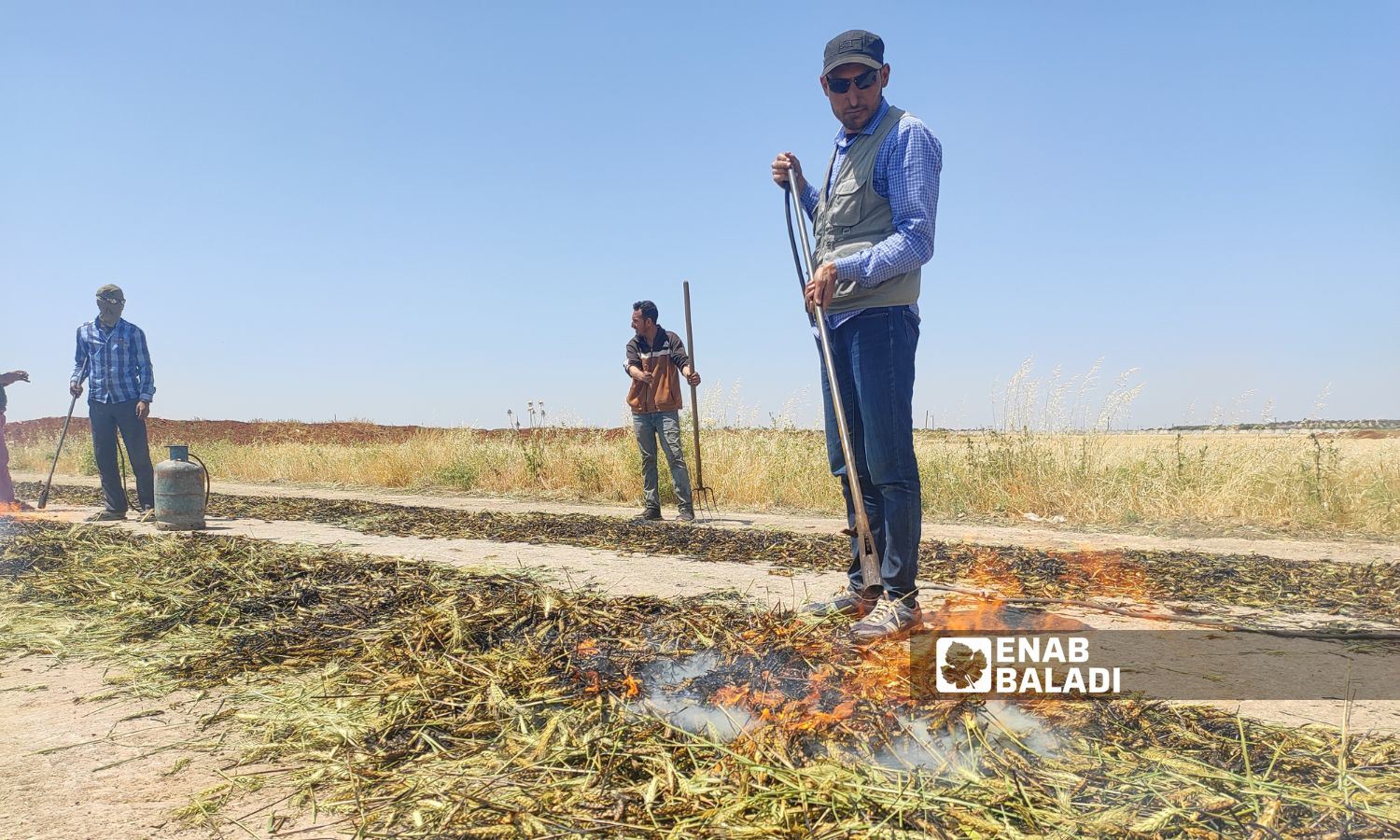
Workers roast the unripened wheat to prepare Freekeh food in the eastern countryside of Idlib – May 14, 2023 (Enab Baladi)
The productivity per hectare ranges between 4 and 5 tons of Freekeh, according to the fertility of the land. Some lands are rented by livestock owners to benefit from the straw and grass remaining after mowing the wheat. The rent per hectare ranges between $100 and $150 after it was estimated at $500 last year.
If the straw dries to be sold as hay for animals, it is expected that this year the price of a tank of hay (about 350 kilograms) will reach $10, compared to $50 last year. (The tank is a box attached to the harvester, in which hay is collected, and its capacity ranges between (300 and 400 kilograms), farmers told Enab Baladi.
When the farmer sells the Freekeh crop, he pays 4% to the auctioneer.
The case of using public roads by farmers and merchants, in coordination with the local councils in each region, appeared for the preparation of Freekeh food.
The new phenomenon was not previously usual and appeared with the receding and limited geographical area and the loss of vast agricultural lands after the regime forces took control of neighboring towns and regions in 2020.
Farmers whom Enab Baladi spoke to explained that “reserving” asphalt roads does not mean closing them completely or even partially, but rather taking a longitudinal space from them in a way that allows the passage of vehicles and vehicles.
Also, the price of the “reservation” varies from one region to another, and it is done by offering the road by the local council in a public auction offered by merchants and farmers.
The amount paid varies according to the distance the farmer takes from the road, and the farmer or the trader pays between $1,000 and $1,500 for a road that accommodates the planting of wheat ears planted on an area of 20 to 30 dunams.
Enab Baladi contacted the Syrian Salvation Government’s local administration ministry, but no comment was received to clarify whether there is a mechanism for imposing sums on each route or whether the matter is under its supervision and follow-up.
A source in the Salvation Government (not authorized to make a statement) told Enab Baladi that the decision to impose sums on road seizures was not officially issued by the ministry but was issued by local councils that have the margin to issue some decisions in their regions, according to the data available to them.
The source stated that the amounts imposed on road seizures are estimated according to the damages resulting from the Freekeh preparation process as some roads are occupied and closed, large areas are reserved, and waste is left as a result of burning, and this causes some damage and results in the imposition of fees.
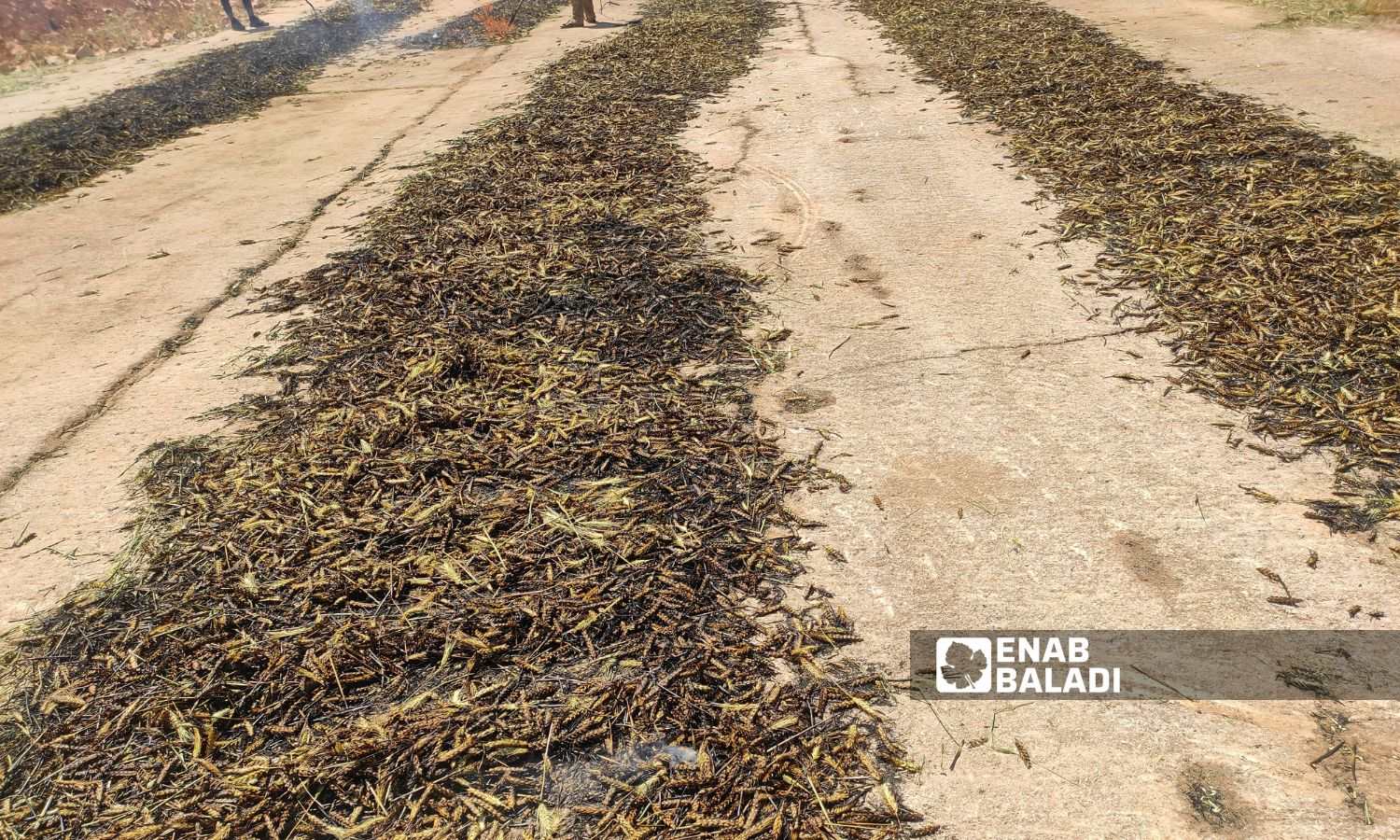
Roasted wheat ears for making Freekeh food in the eastern countryside of Idlib – May 14, 2023 (Enab Baladi)
Tammam al-Hamoud, head of the agriculture directorate in the Salvation Government in Idlib, told Enab Baladi that the preparation of Freekeh does not affect the amount of wheat production, adding that the preliminary estimates of wheat production for this year are estimated at 99,000 tons.
Al-Hamoud explained that the quantities of Freekeh produced each year are estimated at between 4,000 and 5,000 tons or 4% of the production.
Part of the wheat stock is consumed locally, and the rest is exported, which contributes to the entry of foreign exchange into the region, he added.
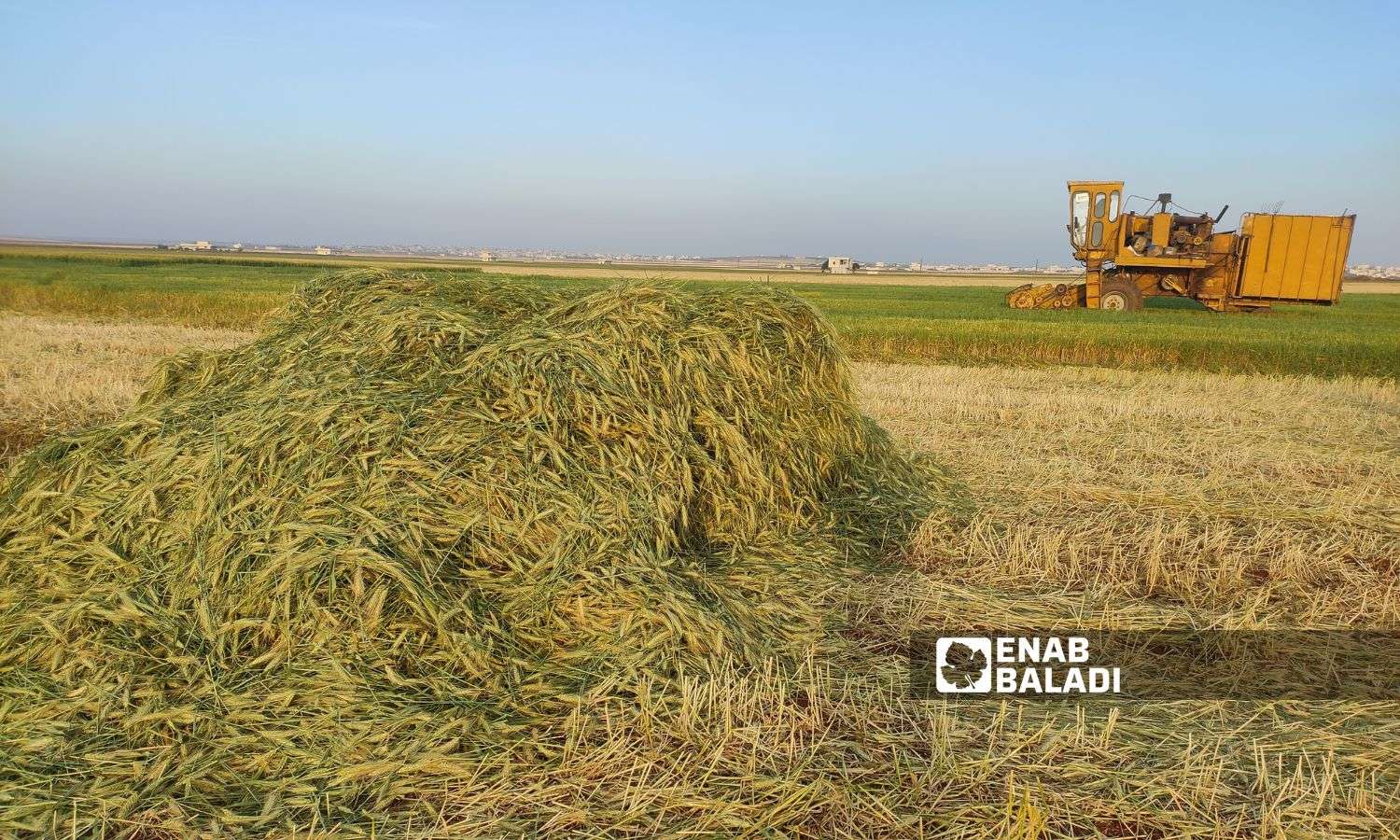
Unripened wheat for preparing Freekeh food in the eastern countryside of Idlib – May 14, 2023 (Enab Baladi)
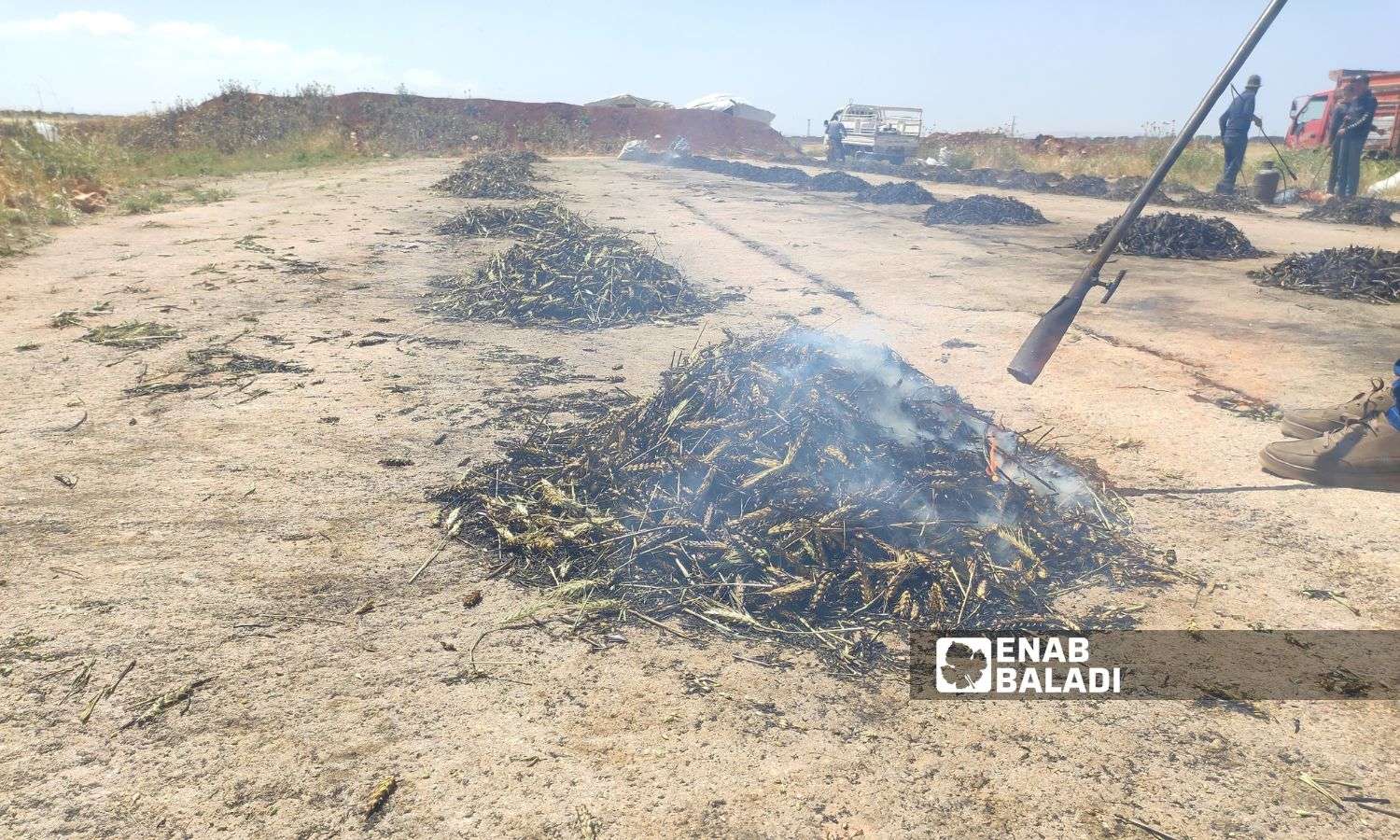
Roasted wheat ears for making Freekeh food in the eastern countryside of Idlib – May 14, 2023 (Enab Baladi)
if you think the article contain wrong information or you have additional details Send Correction